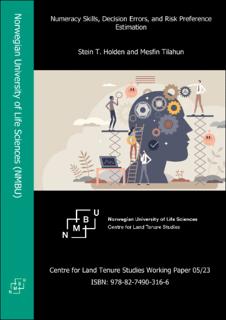| dc.contributor.author | Holden, Stein T. | |
| dc.contributor.author | Tilahun, Mesfin | |
| dc.coverage.spatial | Ethiopia | en_US |
| dc.date.accessioned | 2023-09-14T23:46:14Z | |
| dc.date.available | 2023-09-14T23:46:14Z | |
| dc.date.issued | 2023-09 | |
| dc.identifier.isbn | 978-82-7490-316-6 | |
| dc.identifier.uri | https://hdl.handle.net/11250/3089611 | |
| dc.description.abstract | Basic numeracy skills are obviously important for rational decisionmaking when agents are facing choices between risky prospects. Poor and vulnerable people with limited education and numeracy skills live in risky environments and have to make rational decisions in order to survive. How capable are they to understand and respond rationally to economists’ tools for the elicitation of risk preferences? Can we make designs that are simple enough for them to give rational responses that reveal their true preferences? And how much does variation in their limited numeracy skills contribute to decision errors and the estimated sizes of their risk preference parameters? Finally, we ask whether Expected Utility (EU) theory is sufficient or whether Rank Dependent Utility (RDU) does better in the analysis of decision errors and risk preferences in our context. We try to answer these research questions based on a large sample of rural youth business group members from Ethiopia based on two variants of a Certainty Equivalent - Multiple Choice List (CE-MCL) approach with 12 and 10 Choice Lists (CLs) per subject. Numeracy skill scores are constructed based on a math test with 15 contextualized questions. The experiment facilitates the estimation of structural models while separating the effects of numeracy skills on decision errors in a Fechner error specification that is a function of numeracy skills and experimental design characteristics. The structural models estimate alternatively Expected Utility (EU) and Rank Dependent Utility (RDU) models, the latter with two-parameter Prelec probability weighting functions.It allows us to assess whether limited numeracy skills are correlated with EU-type risk tolerance (utility curvature) and RDU-type of probabilistic risk tolerance in the form of probabilistic insensitivity and optimism/pessimism bias. We find that weak numeracy skills are associated with slightly less risk tolerance in EU models, with stronger probabilistic insensitivity in RDU models, and with more random noise (Fechner error) in both types of models. However, even the subjects with the weakest numeracy skills performed quite well in the simple CE-MCL experiments with the binary choice elicitation approach, indicating that it was capable of revealing the risk preferences of such subjects with very low numeracy skills as they produced only marginally more decision errors than subjects with better numeracy skills. | en_US |
| dc.language.iso | eng | en_US |
| dc.publisher | Norwegian University of Life Sciences, Ås | en_US |
| dc.relation.ispartofseries | CLTS Working paper;05/23 | |
| dc.rights | Attribution-NonCommercial-NoDerivatives 4.0 Internasjonal | * |
| dc.rights.uri | http://creativecommons.org/licenses/by-nc-nd/4.0/deed.no | * |
| dc.subject | Numeracy skills | en_US |
| dc.subject | Risk preferences | en_US |
| dc.subject | Field experiment | en_US |
| dc.subject | Ethiopia | en_US |
| dc.title | Numeracy Skills, Decision Errors, and Risk Preference Estimation | en_US |
| dc.type | Working paper | en_US |
| dc.source.pagenumber | 41 | en_US |

